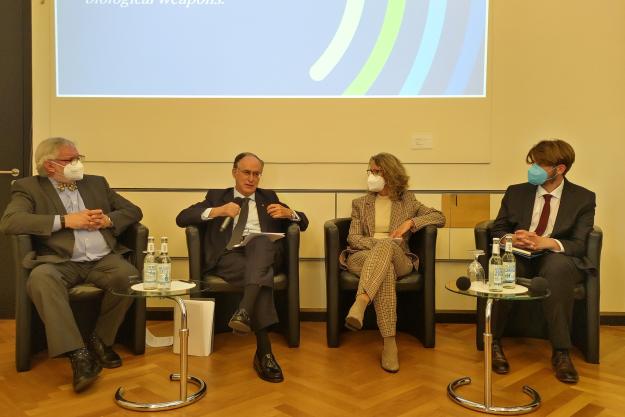The Director-General of the Organisation for the Prohibition of Chemical Weapons (OPCW) Ambassador Fernando Arias paid an official visit to Germany today. The visit coincides with the 25th anniversary of the entry into force of the Chemical Weapons Convention (CWC) and establishment of the OPCW.
The Director-General met with Germany's Minister of Foreign Affairs, H.E. Ms Annalena Baerbock, exchanging on the current challenges facing the CWC and how to counter them.
The Director-General also met with State Secretary for Foreign Affairs, Ms Susanne Baumann, and high-ranking officials of the Federal Ministry of Defence and Federal Chancellor's Office.
While in Berlin, the Director-General delivered remarks at the launch of the competence network CBWNet think tank, a four-year project involving four research institutions from German universities which have joined forces to strengthen the norm against chemical and biological weapons. The group will provide analysis of threats to the global consensus against these weapons and propose recommendations for policymakers to consider implementing to uphold the norm.
Director-General Arias underlined in his remarks: "The success of the Convention over the past quarter century is the result of the commitment of its States Parties. However, to confidently meet our open-ended agenda to prevent the re-emergence of chemical weapons we will need all stakeholders to play their part. This includes governments, civil society, academia, chemical industry, and the entire international community. I would like to commend the four German research institutions for the launch of CBWNet. The OPCW stands ready to cooperate with you in this initiative."

Ambassador Mr Fernando Arias, OPCW Director-General, delivers remarks at the launch event of CBWNet.
At the launch event, State Secretary Baumann highlighted that "the CBW-Network is an essential part in our line of defence against upcoming chemical weapons risks and against those who are undermining the global arms control infrastructure".
The visit to Berlin takes place on the 25th anniversary of the entry into force of the Chemical Weapons Convention (CWC) and the establishment of the OPCW. Negotiated within a multilateral framework, the CWC is the first multilateral treaty that bans an entire category of weapons of mass destruction.
Background
CBWNet is carried out jointly by the Institute for Peace Research and Security Policy (IFSH) at the University of Hamburg (IFSH), the Chair for Public Law and International Law at the University of Gießen, the Peace Research Institute Frankfurt (PRIF), and the Carl Friedrich Weizsäcker-Centre for Science and Peace Research (ZNF) at the University of Hamburg.
As the implementing body for the Convention, the OPCW, with its 193 Member States, oversees the global endeavour to permanently eliminate chemical weapons. Since the Convention's entry into force in 1997, it is the most successful disarmament treaty eliminating an entire class of weapons of mass destruction.
Over 99% of all declared chemical weapon stockpiles have been destroyed under OPCW verification. For its extensive efforts in eliminating chemical weapons, the OPCW received the 2013 Nobel Peace Prize.






